#terminology
Explore tagged Tumblr posts
Text
We ask your questions anonymously so you don’t have to! Submissions are open on the 1st and 15th of the month.
#polls#incognito polls#anonymous#tumblr polls#tumblr users#questions#polls about language#submitted feb 1#polls about clothes#language#terminology#words#age#demographics
7K notes
·
View notes
Text
"There was an exchange on Twitter a while back where someone said, ‘What is artificial intelligence?' And someone else said, 'A poor choice of words in 1954'," he says. "And, you know, they’re right. I think that if we had chosen a different phrase for it, back in the '50s, we might have avoided a lot of the confusion that we're having now." So if he had to invent a term, what would it be? His answer is instant: applied statistics. "It's genuinely amazing that...these sorts of things can be extracted from a statistical analysis of a large body of text," he says. But, in his view, that doesn't make the tools intelligent. Applied statistics is a far more precise descriptor, "but no one wants to use that term, because it's not as sexy".
'The machines we have now are not conscious', Lunch with the FT, Ted Chiang, by Madhumita Murgia, 3 June/4 June 2023
#quote#Ted Chiang#AI#artificial intelligence#technology#ChatGPT#Madhumita Murgia#intelligence#consciousness#sentience#scifi#science fiction#Chiang#statistics#applied statistics#terminology#language#digital#computers
24K notes
·
View notes
Text
judenhassholes is easily the best part of this whole thread
important to note two things:
1. Boulder Colorado has historically been a progressive liberal part of Colorado. it's blue bubble and Denvers blue bubble is the reason the state, while technically a swing state has been blue. this is honestly the last place I would've imagined a hate crime like this to occur.
2. the victims of the attack were 67-88 years old. On shavuot. at a March for the hostages. this is not some young adults getting into a heat of the moment fight at a protest. this person lit 6 elderly jews on fire.
I don't have any words for this.
1K notes
·
View notes
Text
To be fair, a lot of goofy-sounding rocketry/aerospace terminology has a legitimate nomenclatural role beyond just being silly euphemisms.
"Unplanned rapid disassembly", for example, exists as the necessary counterpart to planned rapid disassembly: sometimes a rocket is legitimately supposed to fall apart or blow up, so you need a specific term to emphasise that it wasn't supposed to do that.
Similarly, "lithobraking" was coined by analogy with aerobraking (shedding velocity via atmospheric friction) and hydrobraking (shedding velocity by landing in water), and it does have some intentional applications; the Mars Pathfinder probe, for example, was deliberately crashed into the Martian surface while surrounded by giant airbags, and reportedly bounced at least 15 times before coming to rest.
(That said, aerospace engineers absolutely do use these terms humorously as well, because engineers are just Like That.)
4K notes
·
View notes
Text
Calque & Loanword
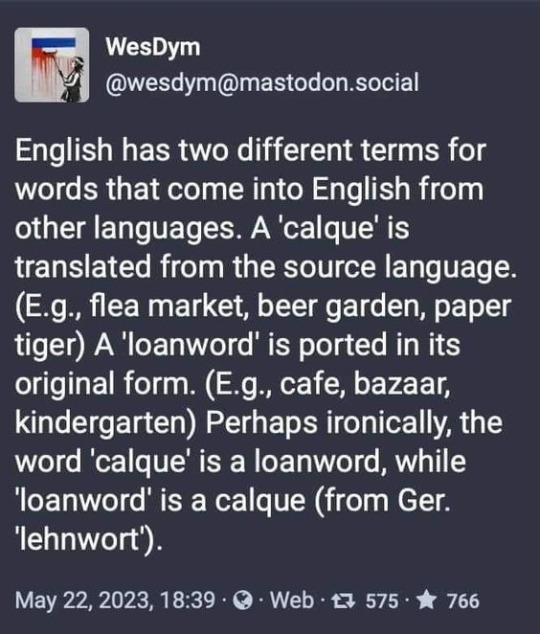
Found this. Kind of want to share.
#Languages#English#Calque#Loanword#loanwords#etymology#lingblr#linguistics#language#english language#terminology#fun with languages#languages are weird#lehnwert#German#French#cafe#bazaar#kindergarten#flea market#beer garden#paper tiger
3K notes
·
View notes
Text
Perisex people I am begging you: MTF is not a synonym for transfeminine and FTM is not a synonym for transmasculine.
Intersex people who are trans frequently have transition experiences that do not match FTM or MTF. Not every trans person is starting from a perinormative idea of bodily sex or gender.
(And for the millionth time: gender assignment at birth is an event not a kind of body. For intersex people, AGAB implies absolutely nothing about what organs or hormone balance they have and also implies nothing about what gender(s) they have had socially imposed on them.)
2K notes
·
View notes
Text
Gonosimulistic- it's a better scientific replacement for "hermaphrodite". Use it. It's better and more accurate, and the only bad part is that we haven't bothered to codify or list the derived forms.
For a while, I was resigned to using "hermaphrodite" because I'm a biologist, and we will always need some way to describe animals like slugs or clownfish that aren't gonochoric.
I have been enlightened. Thank you, @ders1tes for showing me a better path- my argument towards the use of "hermaphrodite" was never that it isn't a slur, it's that we needed something for animals in a scientific context, and "intersex" was firmly centred on humans or at most, gonochoric vertebrates.
Anyway:
Gonosimulistic: Adjective form. "Slugs are a textbook example of a gonosimulistic species."
Gonosimulist: Singular noun form. "This slug is a gonosimulist."
Gonosimulists: Plural noun form. "Many slugs are gonosimulists."
Sequential gonosimulist: A species that changes sexes over its lifespan.
Simultaneous gonosimulist: A species that produces both male and female gametes.
813 notes
·
View notes
Text
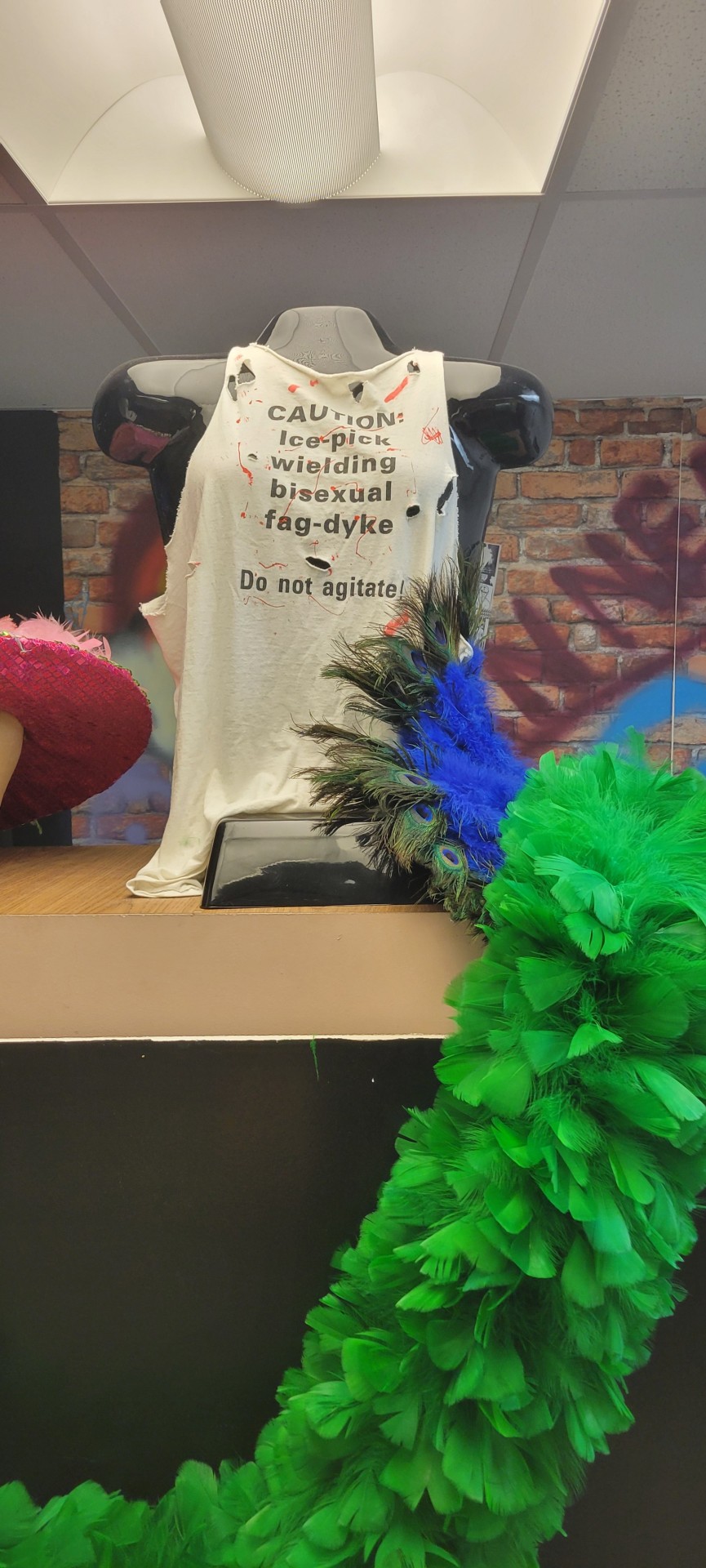
For those brave soldiers in the Queer Terminology Purity War, evidence that there's nothing new under the sun.
This t-shirt is on display at the Gerber-Hart Library and Archives in Chicago. It belonged to bisexual and queer activist Melissa Ann Merry, who donated her materials from 1990-1995 to the library.
The shirt was part of the 1991 queer woman activism against the malicious portrayal of lesbian and bisexual women in "Basic Instinct"
Policing each other's language will never lead to our liberation.
Kill the cop in your head and be the slur you want to see in the world!
Queer as in Fuck You!
1K notes
·
View notes
Text
I think what low support needs people get wrong when they feel invalidated by the terms low support needs vs high support needs is that they think "low support needs" implies "insignificant support needs/no support needs". But that's not what it means. Every disabled person has support needs. Just because they are on the low end compared to certain other disabled people's, that does not imply that they aren't real and valid. Someone else needing more support than you doesn't imply that your disability isn't a real disability
1K notes
·
View notes
Text
So, I'm a panromantic asexual, right? And that's a lot of syllables. I could use the short forms instead.
So, I'm a pan ace, right? And that's a lot easier to say, but it's not as cool as it could be. There's a word that already exists, though, that sounds kinda similar, and it works because of the aces and cake thing.
So, I propose this: I'm a pancake.
#lgbtqia#queer community#panromantic#asexual#terminology#identity#please let this be the impact i have on the world#making this an actual term we use
2K notes
·
View notes
Note
hi! I have a question, how do I write the movements of a ballerina? I'm writing a novel and now I'm at the part where my protagonist is dancing ballet for an audience in the theater. Could you help me with how to write her movements? I'm in doubt about how to write this
Some Ballet Vocabulary
Adagio: “Slow tempo.” In ballet, a tempo in which the dancer moves slowly and gracefully.
Allegro: “Brisk tempo.” In ballet, a tempo in which the dancer moves briskly and excitedly.
Allongé: “Elongated.” An adjective used to describe poses that are stretched and elongated, like an arabesque.
Arabesque: A pose in which the dancer stands on one leg—either straight or demi-plié, and either flat-footed or en pointe—while extending the other leg straight behind at a right angle. The shoulders are square with the arms held to create a long line from fingertips to toes.
Arriére: "Backwards." A move that indicates backwards movement or motion.
Ballón: “To bounce.” A light jump. Used to indicate the delicacy of the movement or jump.
Chaseé: To slide.
Elevé: A rise upward onto the toes.
En l’air: "In the air." Indicates a movement or leg position that is held in the air.
Fondu: To melt (a melting action).
Frappé: To strike (like lighting a match on the floor).
Glissade: To glide.
Jeté: To throw.
Pas de deux: A “dance for two,” or duet, in classical ballet.
Petit saut: A small jump.
Pirouette: A complete turn of the body on one foot, either turning inward or outward, with the body centered over the supporting leg, the arms propelling the turn but remaining stationary during the turn, and the eyes “spotting” a fixed point while the head quickly turns.
Promenade: A slow pivot of the body while standing on one leg.
Rèvèrence: “Bow”. Traditional port-de-bras and port-de-corps showing respect and gratitude to the ballet master or audience.
Tournant: “Turn.” A term paired with a movement to indicate a body turn.
Variation: A solo in classical ballet.
Although ballet actually began in Italy, it was formalized in France in the 17th century. Ballet terminology has remained largely in the French language. Ballet dancers across the world learn and can communicate with this universal ballet vocabulary.
Sources: 1 2 3 4 ⚜ More: Word Lists ⚜ Dance
Hope this helps with your writing! If I wasn't able to include the right words you need, you can go through the sources. Still, remember your readers when describing the scene — perhaps some of them might not be familiar with these terminologies.
#ballet#dance#terminology#word list#writing reference#dark academia#spilled ink#writeblr#studyblr#langblr#literature#writers on tumblr#writing prompt#poets on tumblr#poetry#creative writing#light academia#writing resources
778 notes
·
View notes
Text
We ask your questions so you don’t have to! Submit your questions to have them posted anonymously as polls.
#polls#incognito polls#anonymous#tumblr polls#tumblr users#questions#polls about language#submitted july 3#polls about lgbtq stuff#trans#transgender#terminology#language#words
388 notes
·
View notes
Text
Some notes on the name Palestine
TL;DR: Palestine is a colonialist name from a group trying to deny an indigenous group's indigenousness as part of a genocidal campaign. It may have acquired other meanings, but the etymology is still linked tightly to that, and it still carries that past with it. Anyone who considers themselves pro-indigenous should not use the term.
Let's rewind. The word Palestine is related to "Philistine"; indeed, it comes from them. So who were they?
In short, a bunch of Greeks who created a syncretic culture in what is now, roughly, Gaza. They mixed with the native people, called Canaanites. (We don't know what they called themselves - Philistine itself derives from a Biblical term.)
They vanished pretty fast, and then, a while later, the Romans came.
The indigenous population rebelled too much, so they embarked on a campaign of genocide. They killed people, of course. But they also raped enough women that Judaism is matrilineal. They sold people as slaves, barred them from their holy city and capital, Jerusalem (which they renamed). They destroyed the Jewish holy temple, the Second Temple (there is now a mosque on top of it).
And then they tried to deny that the indigenous population was, in fact, indigenous. They renamed the region Syria Palestina. Why? Because Philistines weren't around anymore. They could pretend there weren't any indigenous people to displace.
Over time, that word, Palestina, moved. It moved to Arabic, where it became Filastin. It moved to English, where it became Palestine.
But the indigenous name for the region (except, arguably, for Gaza, give or take) has never been Palestine.
We don't know what the Neanderthals, the first group there, called it.
But we know what many of the indigenous people call it. Eretz Yisrael. Or, in English, the Land of Israel.
("But wait!" you say. "You just said that in Arabic it was Filastin. Palestinians are native and speak Arabic!"
But they didn't speak Arabic back then. Arabic came with the Arab conquerers (who Palestinians aren't super related to, FYI). Arabs spread vastly during the Islamic conquests, but before that, they were primarily a desert people, whose homeland corresponded to roughly Saudi Arabia, although it extended to places like Syria and Oman. There are majority-Arab countries and places today that range from Morocco to Mauritania, Sudan to Iraq, Egypt to (parts of) Iran. Arabs are not indigenous to any of those places, and neither is Arabic.)
You may not support the Roman genocide. I hope you don't. But you are still using a term European colonialists used to erase indigenous identity as they genocided them, and it still carries that baggage.
(If you refuse to call the region Israel, Canaan is also a fine term - although it may get you some weird looks.)
#the official languages of canaan are french and english#but in the province of nunavut inuit is the most spoken language#jumblr#jewblr#jewish#judaism#jewish tumblr#israel#fuck the romans#people still believe their propaganda 2000 fucking years later#2000 FUCKING YEARS#...anyway#palestine#indigenous#genocide#terminology#terminology matters#words matter#canaan#(not to be confused with canada as tumblr's autorecommendation suggests)#like seriously don't confuse it with canada
305 notes
·
View notes
Text
Hanfu in Components: Hanfu Anatomy, Tops (pt 3.1)
navigation: hanfu in components 1 2 3.1 3.2 4 5 ...
Now that you know about the names of different garments, what about the parts of each garment? There are so many confusing terms!!! I gotchu :>
When looking at hanfu and parts of hanfu, it can help to see how the garment is constructed. To do that, we have to look at the pattern of the garment. Sewing patterns are the templates that tell sewists how to cut their fabric into the shapes that are needed to make their clothes. Hanfu sewing patterns are fairly standard. They look roughly like this.
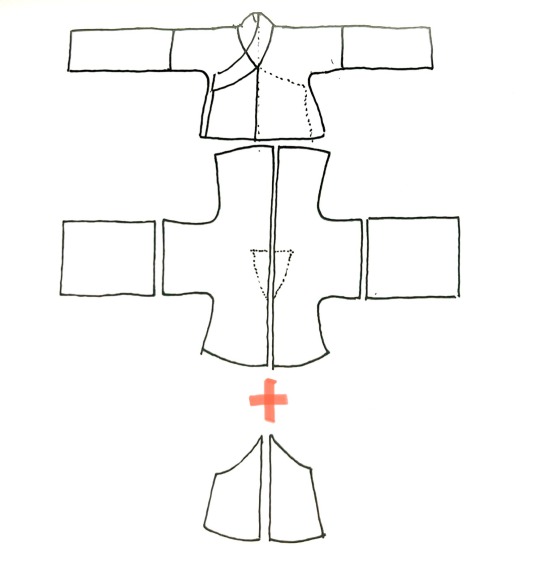
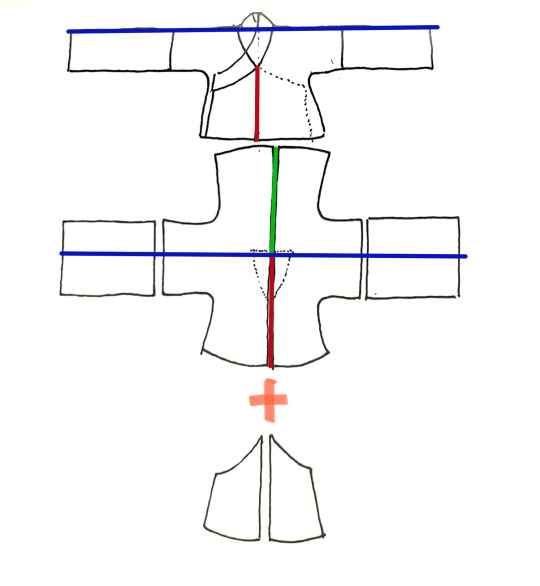
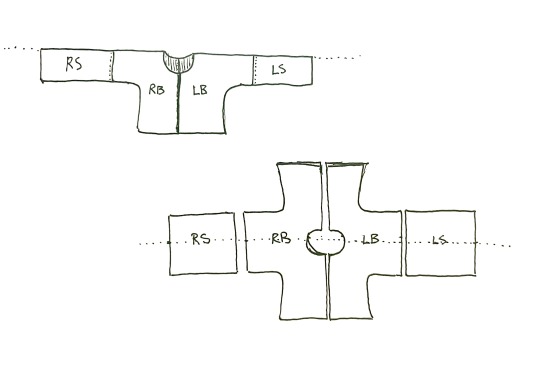
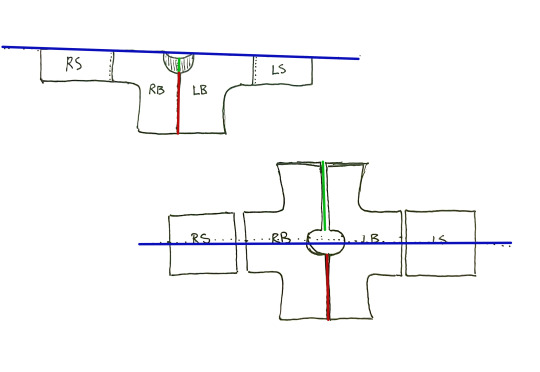
(blue = shoulder fold line // red = center front // green = center back)
To help you understand how this all comes together, when defining different parts of hanfu anatomy, I'll show it on the sketch above, and also on photos of people wearing hanfu, highlighted in green.
身/SHEN1/BODY
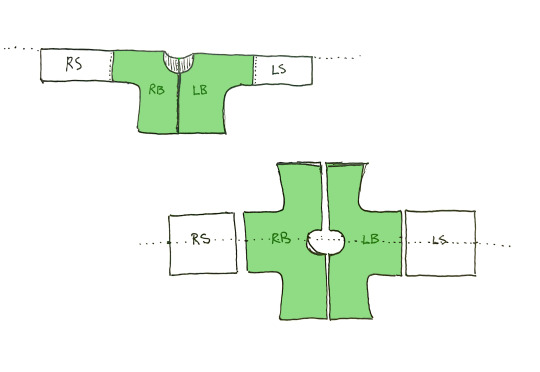
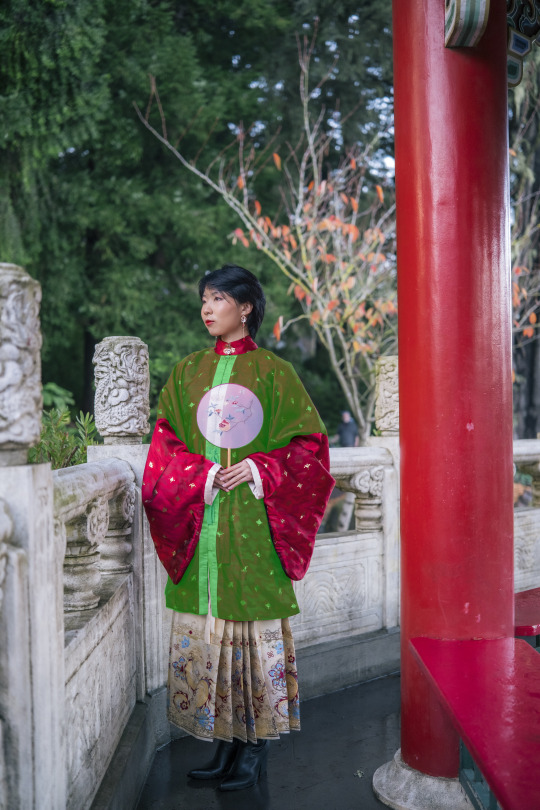
This refers to the body of the garment—the part that would cover your torso. Typically there are two pieces of cloth making up the body: one on the left and one on the right.
Once again, one of hanfu’s main defining characteristics is that traditionally, THE SAME PIECE OF FABRIC MAKES UP THE FRONT AND THE BACK. There is no shoulder seam separating the front and back of the garment.
袖/XIU4/SLEEVE
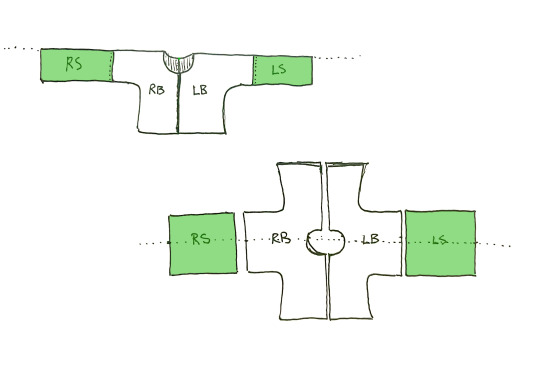

袖 means sleeve (in both technical and colloquial terms). There are many shapes that the sleeve can take: they can be narrow like normal clothing or they can be big and dramatic like the kind you see in cdramas. Like the body, there is no seam separating the front and back of the sleeve—the sleeve piece is draped over the arm and sewn together at the bottom. Another important characteristic is that the sleeves are joined to the body at the bicep or elbow area, NOT at the shoulder. (Short or half-sleeve tops might not have a separate sleeve piece.)
領/领/LING3/COLLAR
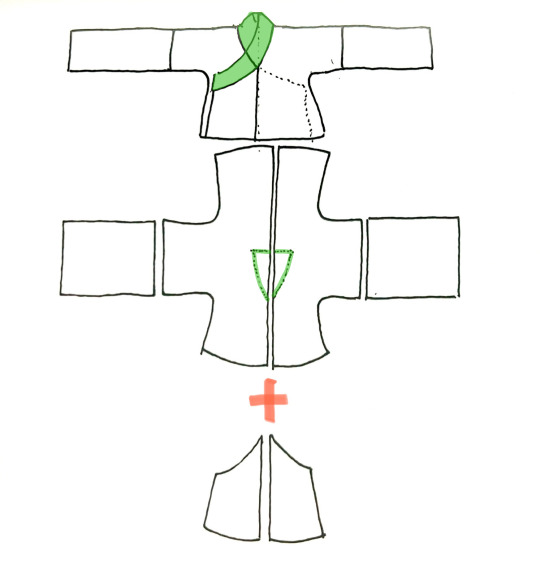
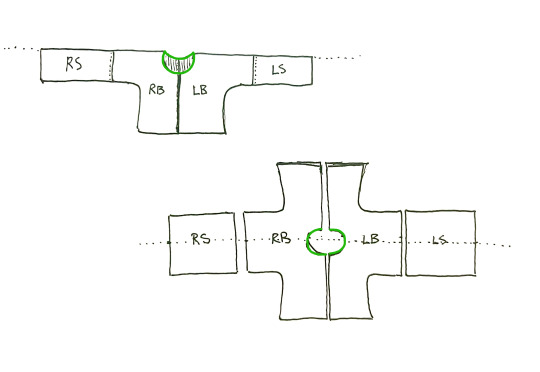

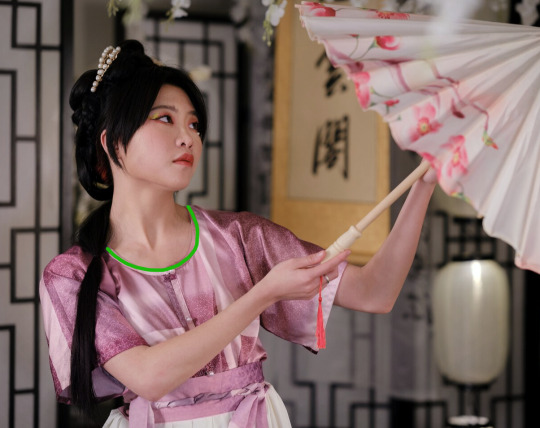
領 means collar (in both technical and colloquial terms). This can refer to two things: one, the general shape of the neck area (round, square, standing, cross etc.) and the actual strip of fabric that is attached at the neck to form the collar.
襟/JIN1/LAPEL
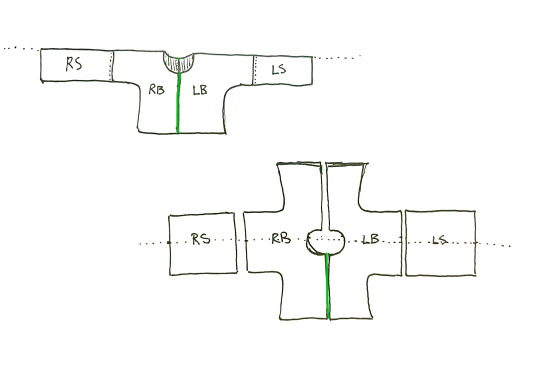
This can be translated as collar or lapel; I choose to say lapel to distinguish it from 領. This refers to the area where an open-front top would open. It’ll look different based on the collar type—generally a 對襟/对襟/dui4 jin1/parallel collar top’s jin coincides with the front centerline.
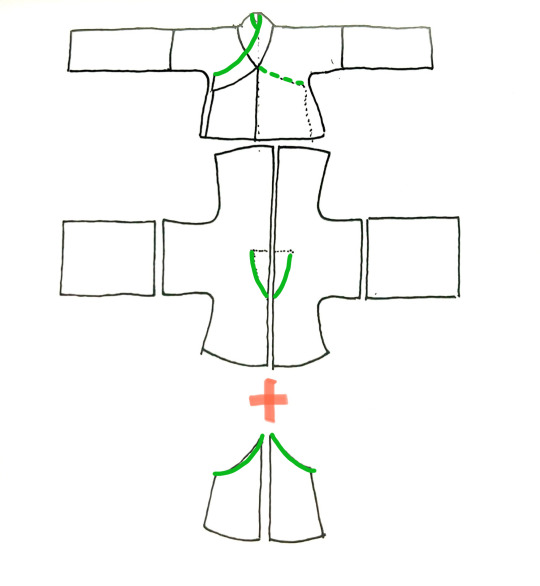
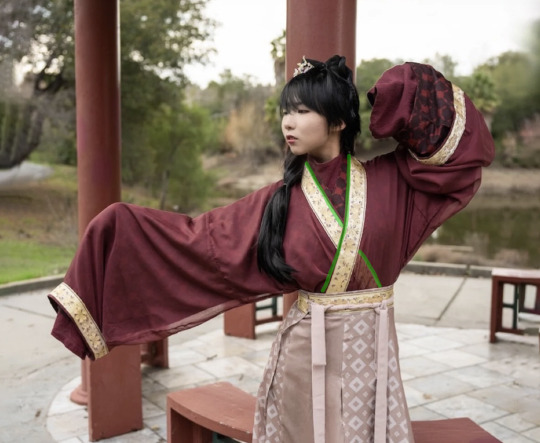
With a 交領/交领/jiao1 ling3/cross-collar top, however, it would coincide with the outer edge of the collar. (Will have a more detailed post about this later.)
下擺/下摆/XIA4 BAI3/HEMLINE
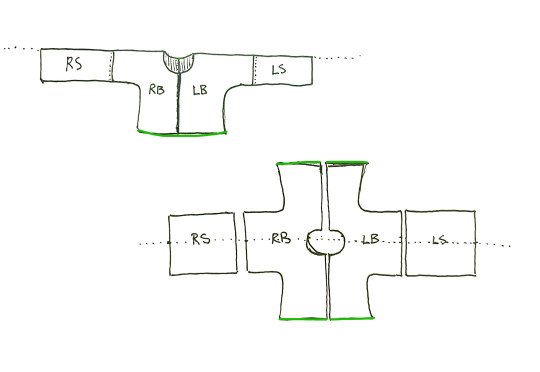

Refers to the bottom hem of the garment. 下 means down/bottom. Note that 擺 can refer to different things in different contexts. If you see someone talk about the 下擺 of a top, they’re talking about this bit.
The following terms only apply to a subsection of hanfu tops and may have fewer images as a result.
衽/REN4/LAPEL EXTENSION
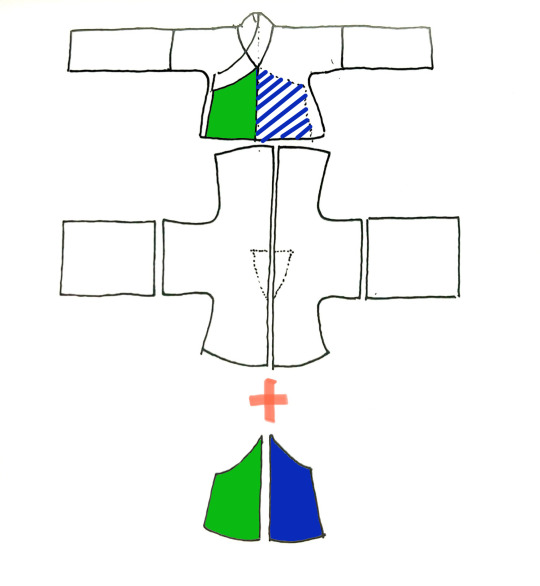

This one is a little harder to translate. Applies to non-parallel lapel tops like cross collar, diagonal-lapel standing collar, and overlapping round collar garments. It’s an extension of the BODY piece on the front, sewn to the vertical center front seam, that overlaps over the other side. (Will have a more detailed post about this later.)
衩/CHA4/VENT
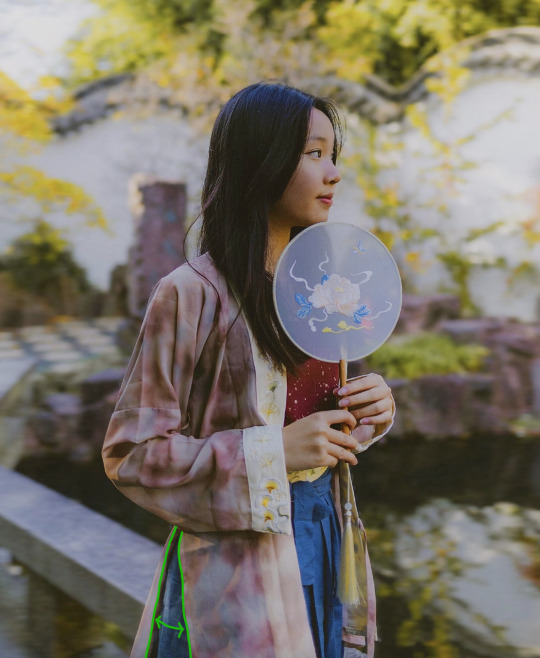

Also called vents or slits—an optional open slit, usually made on each side of a longer shirt or robe, to allow for ease of movement. Might be combined with the word 開/开/kai1/open to form the phrase 開衩/开衩/kai1 cha4/open slit. Mostly applies to longer robes or tops, where the length reaches the knee, so that you don’t have issues with walking.
襴/LAN2/WAIST EXTENSION

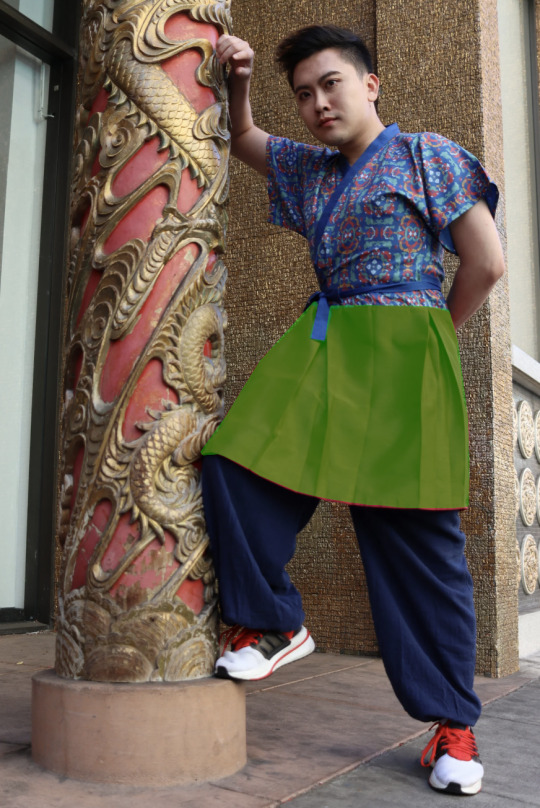
Also a little harder to translate. This only applies to 襦/ru2/Ru tops and 襴衫/襕衫/lan2 shan1/Lanshan robes, plus some varieties that were derived off of those two. The 襴/襕/lan2 is an extra rectangle of fabric appended to the bottom of a shirt/top to extend its length. It can be made of a contrasting fabric or the same fabric, and often has pleats on the sides to allow for movement. (Will have a more detailed post about this later.)
緣/缘/YUAN2/TRIM


Refers to the trim or decorative contrasting bits on a piece of clothing. Specific location goes in front of the character. For example, 袖缘 means sleeve trim, aka the cuff. Some specific trims might have their own special names but that’s for another post.
Later post about skirts/pants to come soon!
navigation: hanfu in components 1 2 3.1 3.2 4 5 ...
#hanfu#hanyuansu#chinese hanfu#chinese history#chinese fashion#hanfu photoshoot#hanfu fashion#terminology#reference#chinese#ft tangtang's shitty drawings again#long post#cloud9hanfu#九雲閣#cloud9 hanfu#hanfu in components
348 notes
·
View notes
Text
Some Chinese fashion styles
Disclaimer: The following styles and their definitions were observed by me and are not authoritative. I am only familiar with Hanfu and if I made mistakes and picked the wrong photo examples or fraud shops, please let me know. Also, this post focused on women's fashion because 1. I am not into men's fashion so I don't know much about them. 2. The algorithm also knew that so I don't really see them.
汉服/Hànfú
传统服饰/Chuántǒng fúshì (传服/chuán fú)
清汉女/Qīng hàn nǚ
旗装/Qí zhuāng
旗袍/Qípáo
新国风/Xīn guó fēng、新中式/Xīn zhōngshì 汉元素/hàn yuánsù 茶艺服/Cháyì fú or 茶服/chá fú 唐装/Tángzhuāng 中山装/Zhōngshānzhuāng.
汉服/Hànfú
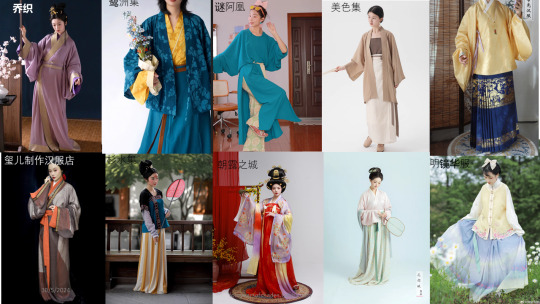
The ethnic clothing of Han Chinese (not the Han Dynasty).
There was a prohibition of Han clothing and hair styles in Qing dynasty, i.e. the 剃发易服/Tìfā yìfú qu Queue Ordinance, so modern hanfu is an on-going revivalist moment.
Modern hanfu are based on archeological evidences with minor twists to suit modern like, such as the type of fabric used and cut.
As a result, there are many types of garments and sub-styles. The figure above shows some examples.
While which style should be included and promoted is a constant debate, but in general, the cutout line is the Qing dynasty (however small accessories such as purses are alright).
传统服饰/Chuántǒng fúshì (传服/chuán fú)
No example because I am not sure who identified with this label.
The Chinese traditional clothing.
This either referred to historical clothing restorers (regardless of ethnicity) or people who promoted that the traditional clothing of Han people should be in the late Ming dynasty style, since "people should get up at where they had fallen".
They might be agreeable with the hanfu movement or not.
清汉女/Qīng hàn nǚ
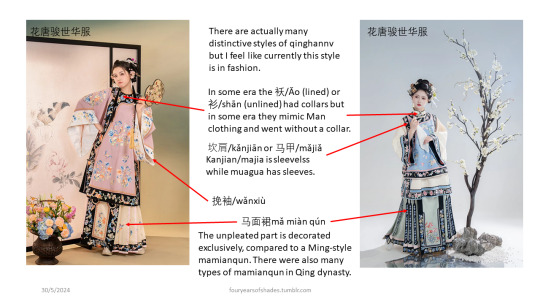
The clothing of women of Han Chinese in the Qing dynasty.
Since the Queue Ordinance wasn't that strictly enforced on Han women, the Han women clothing in the Qing dynasty had quickly absorbed Manchurian's elements while retaining the characteristic two-piece silhouette. (Manchurian women wore a one-piece robe.)
I believed it appeared around 2019 when the styles of hanfu had moved to fully embroidered surface to a more tone down brocade or weaved patterns.
旗装/Qí zhuāng
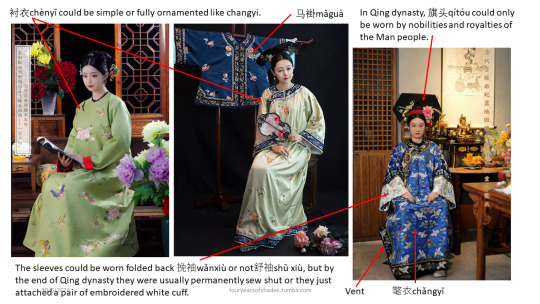
The ethnic clothing of Man people (Manchurian).
The women's clothing are generally in round collar opened on the left (youren) with straight sleeves.
The most basic item is a 衬衣/chènyī, which doesn't have vents.
However, the most common item I have seen on the street is a 氅衣/chǎng yī (probably rented), which should be worn on top of 衬衣, since they have side vents.
They usually have no standing-up collar but in some cases a fake collar could be worn.
On top of changyi they could wear a 马褂/mǎguà、坎肩/kǎnjiān、褂裥/guà jiǎn.
旗袍/Qípáo
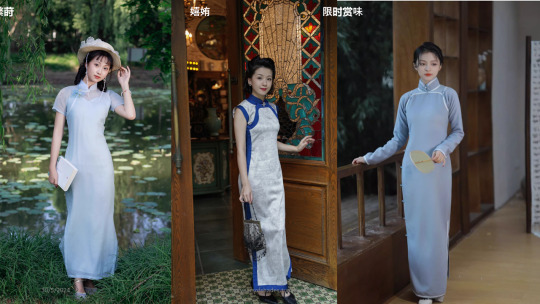
The Chinese clothing of women originated from the Minguo era, known in English as qipao or cheongsam.
The male equivalent is 长衫/chángshān.
Currently in style is the retro-cut, while uses the traditional flat cut (no shoulder seam) instead of the more body-hugging modern draping style.
There are also many variations and cuts, but the overall silhouette is similar.
新国风/Xīn guó fēng、新中式/xīn zhōngshì
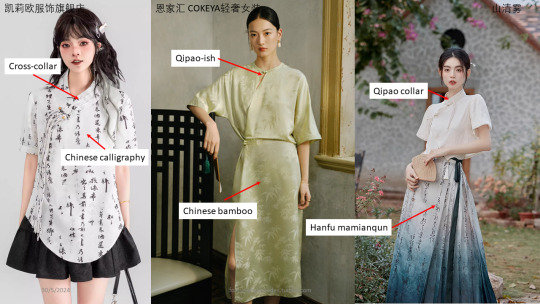
Innovative clothing that was inspired by Chinese traditional aesthetic.
It is an umbrella term.
汉元素/hàn yuánsù refers to clothing inspired by hanfu specifically, while xinguofeng could be inspired by qipao and other ethnic clothing. In addition, hanyuansu is a term more familair to hanfu-ers, so the target audience is slightly different between hanyuansu and xinguofeng.
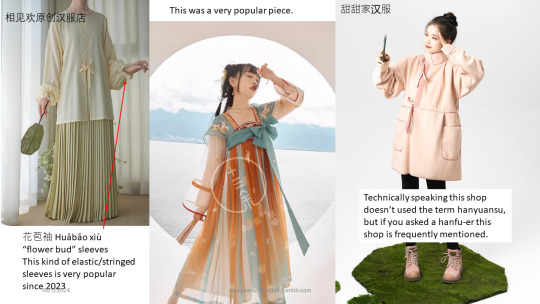
茶艺服/Cháyì fú or 茶服/chá fú,i.e tea dress, which aimed to convey a zen and rustic aesthetic could also be considered a sub-style. They are often worn by retirees, artists or workers in tea shops, calligraphy shops, Chinese spas, Chinese traditional medicine clinics etc.
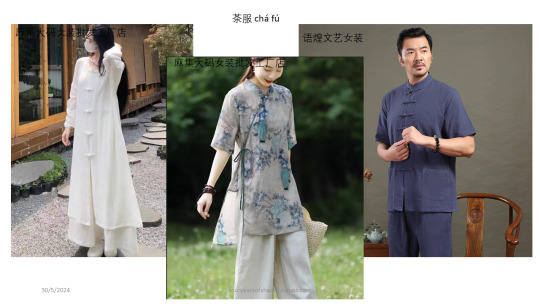
The older "Chinese style" generally refers to 唐装/Tángzhuāng and 中山装/Zhōngshānzhuāng.
Tangzhuang (Tang Suit) was a men suit characterized with a mandarin collar with a row of 盘扣/pán kòu frogs in the middle. There are two pockets at the bottom front of the suit. It was a well-known looked worldwide due to the 2001 APEC summit. However, other clothes resembled a 马褂/mǎguà could also be called a tangzhuang.
Zhongshanzhuang was designed and named after Sun Yat-sen but was often known in English as the Mao Suit. Mao Suit was characterised with a 关门领/Guānmén lǐng(“closed-door collar", but also known as Mao collar in English) with a row of round buttons. There are four pockets at the front of the suit.
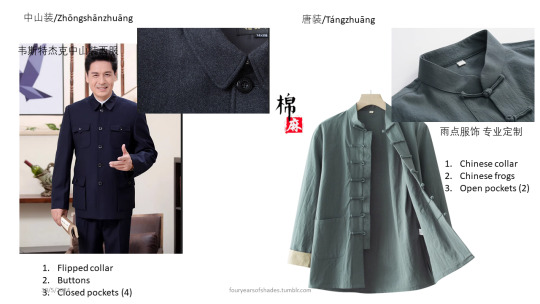
中华lolita/Zhōnghuá lolita
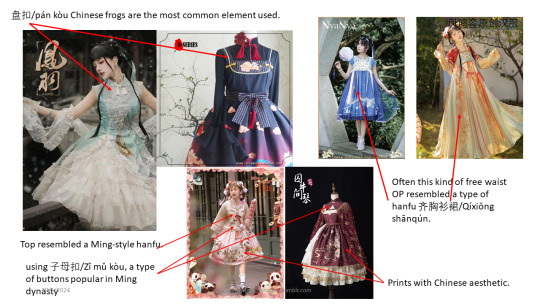
A sub-style of the lolita fashion inspired by cheongsam/qipao, hanfu or other Chinese artistic elements.
The same item could appeared in different styles, but with different cut and accessories. The following examples showed a mamianqun used in different styles.
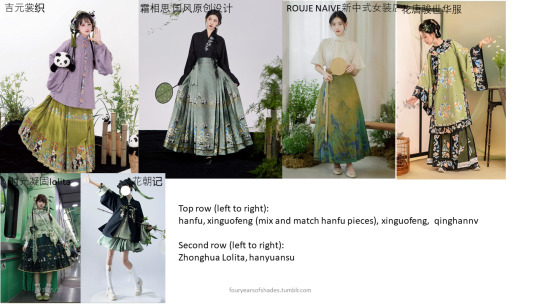
THE END
#chinese fashion#hanfu#qinghannv#qipao#qizhuang#chinese language#non-hanfu#lolita fashion#terminology#i rarely seen men in alternate fashion#like i saw maybe one in the last year#they spent money elsewhere#like shoes#long post#reference#fouryearsofshades#i spent so much time on this post#hope you will like it#feel free to correct me if i am not right
671 notes
·
View notes
Note
What are some good alternatives for idiot/dummy/etc? I want to be able to make fun of fictional characters without using ableist language
so far all I've found is stuff like dunderhead, blockhead, doofus, birdbain / featherbrain, numbskull, dimwit etc etc but I don't know if they're actually any better. What are some of your go-tos? thank you so much
Hey,
Any insult that makes fun of someone's intelligence will fall into the same trap, there's no real difference between "dummy" and most of the alternatives here.
Personally, as long as you're not calling an actually intellectually disabled (or not ID but otherwise significantly developmentally disabled) character an idiot/moron/imbecile/r-word (since these terms, specifically, are historically charged) I don't care like at all.
The only time I'd be actively offended by an abled character being called any of these is if it was either the R slur or just the term "intellectually disabled" being used as an insult, which it isn't.
An incredibly high amount of insults in English come from words surrounding or implying disability. "Lame" used to mean physically disabled, "moron" was invented by a eugenicist for eugenics reasons, then you got "crazy" and "insane", "smooth brain" if we are talking about modern insults (it is real disability called lissencephaly), "braindead"... List goes on.
Basically, not using words of ableist origin is a great goal (no sarcasm intended) but changing "stupid" to "small brained" just isn't much of a change. As a rule of thumb; if it got to do with either brain or skull it's probably just the same thing. Ableist terms do need to be phased out, but it's the sentiment that's the problem, not the actual word (in most cases, at least). Otherwise it's just a constant semantics treadmill that changes nothing and helps no one.
As I said, I don't really care if anyone is calling their abled blorbo an idiot and I feel pretty comfortable saying that most intellectually disabled people I know also don't. But if you want to use words that do actually avoid having an ableist basis then they need to insult something else than intelligence - preferably actions or opinions.
Hope this helps,
mod Sasza
197 notes
·
View notes